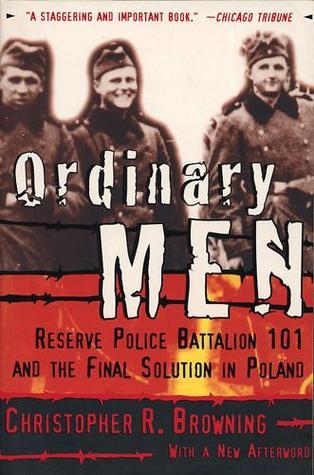Ordinary Men Book Summary
Reserve Police Battalion 101 and the Final Solution in Poland
TL;DR
Christopher R. Browning's "Ordinary Men" reveals how an average group of German men became participants in the Holocaust, exploring the psychological and social dynamics that led to their horrific actions.
What is Ordinary Men about
"Ordinary Men: Reserve Police Battalion 101 and the Final Solution in Poland" provides a chilling exploration of how a unit of German police officers, composed largely of middle-aged working-class men, became involved in the mass murder of tens of thousands of Jews during World War II. Browning argues that these men were not driven by fanaticism or ideology but were influenced by social pressures such as conformity, authority, and the dangerous flexibility of moral norms. The book dissects the group dynamics within Reserve Police Battalion 101, illustrating how these ordinary individuals transformed into killers under the constraints and expectations of their environment.
Ordinary Men 7 Key Takeaways
Group Dynamics and Conformity
Browning highlights how the pressures of group identity and dynamics can lead ordinary people to commit heinous acts, illustrating the psychological mechanisms at play.
Role Adaptation
The men of Battalion 101 adapted their roles from civilians to perpetrators, often rationalizing their actions as a response to situational demands rather than personal beliefs.
Moral Disengagement
Many members of the battalion justified their participation in the killings by altering moral norms, distancing themselves from the consequences of their actions.
Correlational Behavior
The book categorizes the men into three groups: eager killers, compliant participants, and resisters, showing how compliance varied within the same unit.
Historical Context
Browning provides necessary context on the rise of the Nazi regime and the specific role of ordinary policing in facilitating the Holocaust.
The Banality of Evil
The narrative embodies the concept of the 'banality of evil,' showcasing how ordinary individuals can perpetrate extraordinary atrocities when placed in dehumanizing situations.
Implications for Modern Society
Browning's analysis warns of the dangers of conformist behavior and complicity in moral transgressions, relevant to contemporary societal issues.
Top Ordinary Men Quotes
- "The greatest danger is not the evil people, but the good people who do nothing."
- "Ordinary men, faced with extraordinary circumstances, can become agents of horrific violence."
- "Conformity can lead to the erosion of one's moral compass, leading individuals to commit acts they would otherwise deem unthinkable."
Who should read Ordinary Men?
This book is ideal for historians, students of psychology, and anyone interested in understanding the darker aspects of human nature and societal compliance. Readers will gain insights into the mechanisms of conformity and moral disengagement that can lead to collective violence, making it a critical reflection on both past and present.
Ordinary Men Best Reviews
- "A masterful analysis of human behavior that challenges our understanding of morality and the capacity for evil." - New York Times Book Review
- "Browning's meticulous research and gripping narrative make this a monumental work on the Holocaust and human psychology." - The Guardian
- "An essential read that poignantly illustrates how ordinary people can commit atrocities under certain pressures." - The Washington Post
People also liked these summaries
Ordinary Men FAQs
What is the main argument of "Ordinary Men"?
Browning argues that ordinary individuals can commit atrocities under social pressures, emphasizing the roles of conformity and moral disengagement in the actions of Reserve Police Battalion 101.
Is "Ordinary Men" based on true events?
Yes, the book is a non-fiction account based on the historical actions of Reserve Police Battalion 101 during the Holocaust, detailing their involvement in mass killings and deportations.
What impact did "Ordinary Men" have on studies of the Holocaust?
The book has significantly influenced Holocaust studies by highlighting the psychological and social dynamics that empower ordinary individuals to commit acts of violence, reshaping understanding of complicity.
